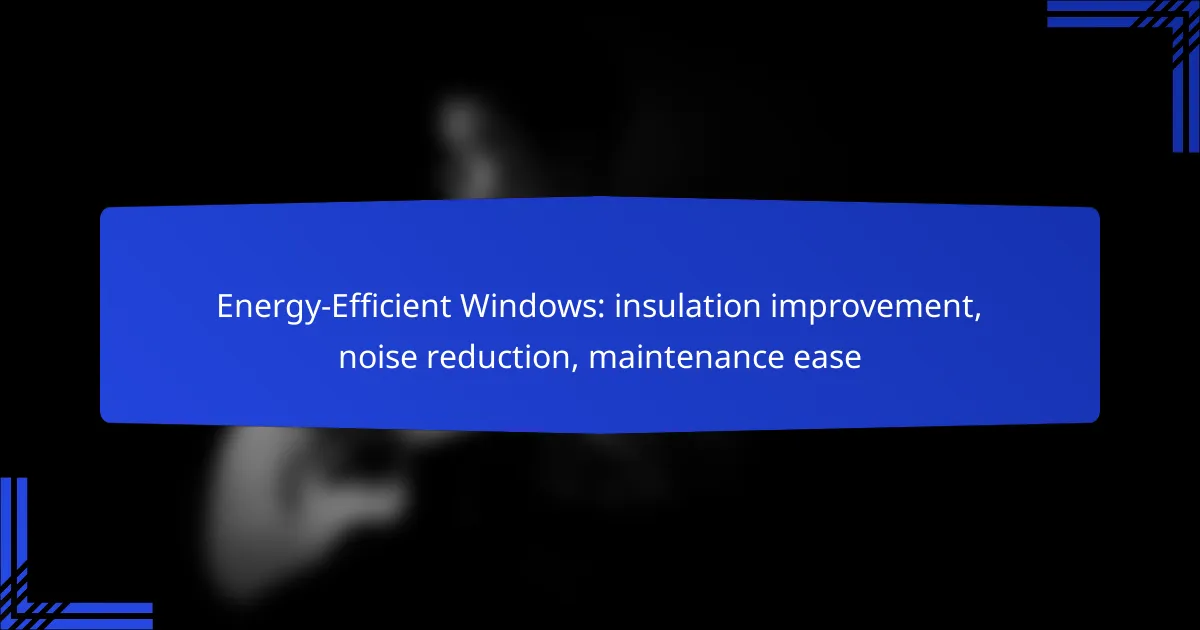Energy-efficient windows are designed to enhance insulation, reduce noise pollution, and simplify maintenance in homes. By minimizing heat transfer, they help lower energy costs while providing a more comfortable living environment. Additionally, their advanced materials and designs effectively block sound transmission, creating quieter spaces. With less upkeep required compared to traditional windows, homeowners can enjoy these benefits with ease.

How do energy-efficient windows improve insulation in UK homes?
Energy-efficient windows enhance insulation in UK homes by minimizing heat transfer and reducing energy costs. They achieve this through advanced technologies that improve thermal performance, making homes more comfortable and energy-efficient.
Low-E glass technology
Low-E (low emissivity) glass technology is designed to reflect heat back into the home while allowing natural light to enter. This type of glass has a special coating that reduces UV and infrared light without compromising visibility. As a result, homes can maintain a stable indoor temperature, reducing reliance on heating systems.
When selecting Low-E glass, consider the specific climate of your area. In the UK, this technology can significantly lower heating costs during colder months, making it a worthwhile investment.
Insulated frames
Insulated frames are crucial for maximizing the energy efficiency of windows. These frames are typically made from materials like uPVC or wood, which provide better thermal insulation compared to traditional materials. A well-insulated frame minimizes heat loss and enhances the overall performance of the window.
When choosing insulated frames, look for those with a high energy rating. In the UK, frames that meet or exceed the British Fenestration Rating Council (BFRC) standards can help ensure optimal insulation and energy savings.
Argon gas fill
Argon gas fill is used between the panes of double or triple-glazed windows to improve insulation. Argon is a colorless, non-toxic gas that has a lower thermal conductivity than air, helping to reduce heat transfer. This results in better insulation and lower energy bills.
When considering windows with argon gas fill, ensure they are properly sealed to prevent gas leakage. This feature is particularly beneficial in the UK, where maintaining warmth during colder months is essential for comfort and energy efficiency.
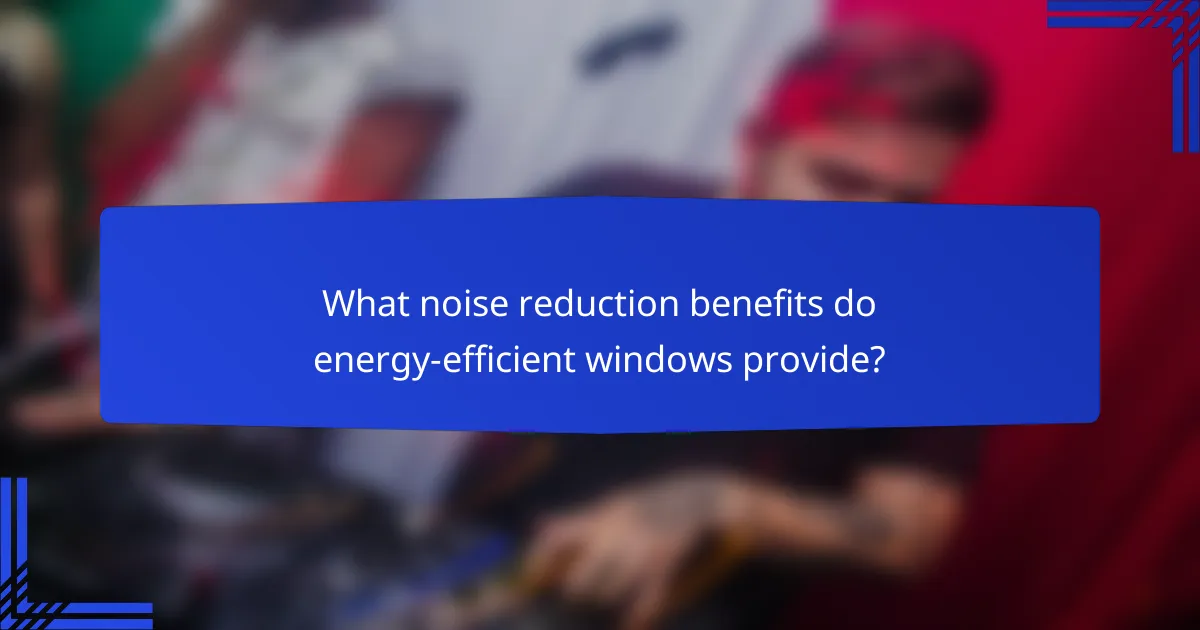
What noise reduction benefits do energy-efficient windows provide?
Energy-efficient windows significantly reduce noise pollution by utilizing advanced materials and designs that block sound transmission. This improvement enhances comfort in homes and offices, making environments quieter and more pleasant.
Soundproofing features
Energy-efficient windows often include soundproofing features such as laminated glass and specialized frames that minimize vibrations. These windows can reduce outside noise levels by up to 50%, depending on the specific construction and materials used.
When selecting soundproof windows, look for features like acoustic seals and multi-chamber frames, which enhance sound insulation. These elements work together to create a barrier against unwanted noise, making your living space more tranquil.
Double and triple glazing
Double and triple glazing are key components of energy-efficient windows that contribute to noise reduction. Double glazing consists of two panes of glass with a space in between, while triple glazing adds a third pane, further increasing sound insulation capabilities.
These glazing options not only improve thermal insulation but also significantly dampen sound. For optimal noise reduction, consider windows with a combination of different thicknesses of glass, as this can disrupt sound waves more effectively than uniform thickness.
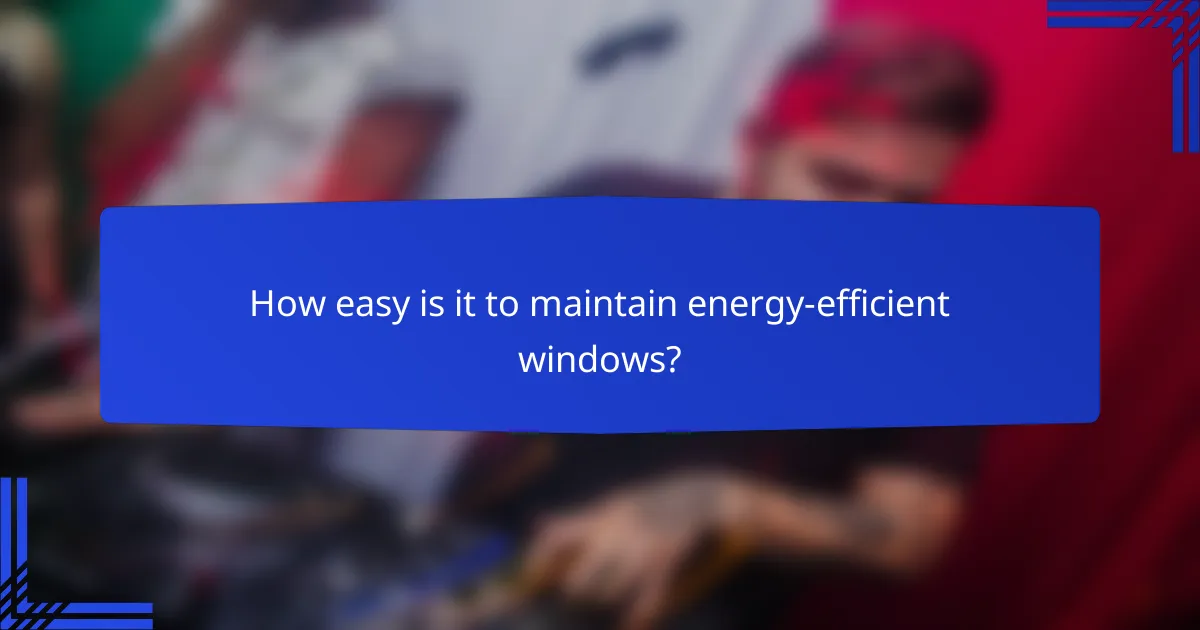
How easy is it to maintain energy-efficient windows?
Maintaining energy-efficient windows is generally straightforward, as they are designed to require less upkeep than traditional windows. With the right materials and features, homeowners can enjoy improved insulation and noise reduction without the hassle of frequent maintenance.
Low maintenance materials
Energy-efficient windows often utilize materials such as vinyl, fiberglass, or aluminum, which resist fading, warping, and corrosion. These materials typically require only occasional cleaning with mild soap and water, making them ideal for busy homeowners.
For instance, vinyl frames are particularly popular due to their durability and resistance to moisture, eliminating the need for painting or sealing. This can save time and money over the lifespan of the windows.
Self-cleaning options
Some energy-efficient windows come with self-cleaning glass, which uses a special coating to break down dirt and grime when exposed to sunlight. This technology can significantly reduce the frequency of window cleaning, as rainwater can wash away the loosened debris.
While self-cleaning windows can be more expensive upfront, they offer long-term savings in maintenance time and effort. Homeowners should consider the climate and local conditions, as effectiveness can vary based on environmental factors.
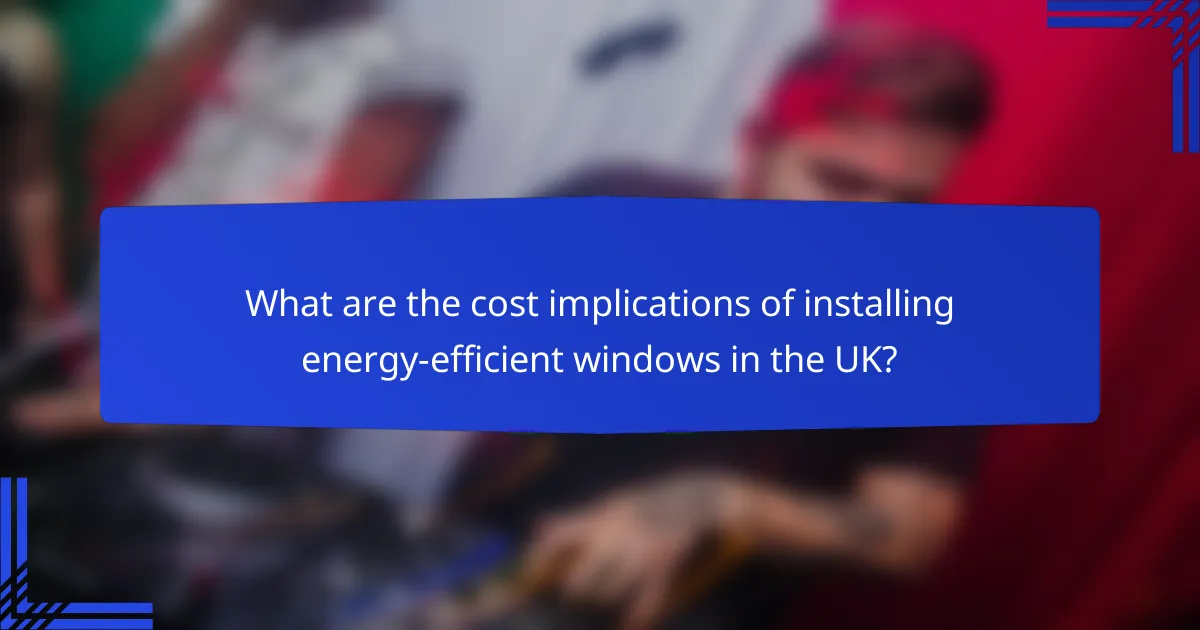
What are the cost implications of installing energy-efficient windows in the UK?
Installing energy-efficient windows in the UK typically involves a higher upfront cost compared to standard windows, but this investment can lead to significant long-term savings on energy bills. Homeowners should consider both the initial expenses and the potential for reduced heating and cooling costs over time.
Initial investment vs. long-term savings
The initial investment for energy-efficient windows can range from several hundred to over a thousand pounds per window, depending on the materials and technology used. However, these windows can reduce energy bills by 10-25% annually, leading to substantial savings over their lifespan of 20 years or more.
When calculating the total cost, consider factors such as installation fees and potential increases in property value. A well-insulated home with energy-efficient windows may attract buyers and command higher prices in the market.
Government incentives and rebates
The UK government offers various incentives to encourage homeowners to install energy-efficient windows, including grants and rebates under schemes like the Energy Company Obligation (ECO). These programs can significantly offset the initial costs, making energy-efficient upgrades more accessible.
Homeowners should check for local initiatives or funding options that may apply to their situation. It’s advisable to consult with certified installers who can provide information on available incentives and help navigate the application process.
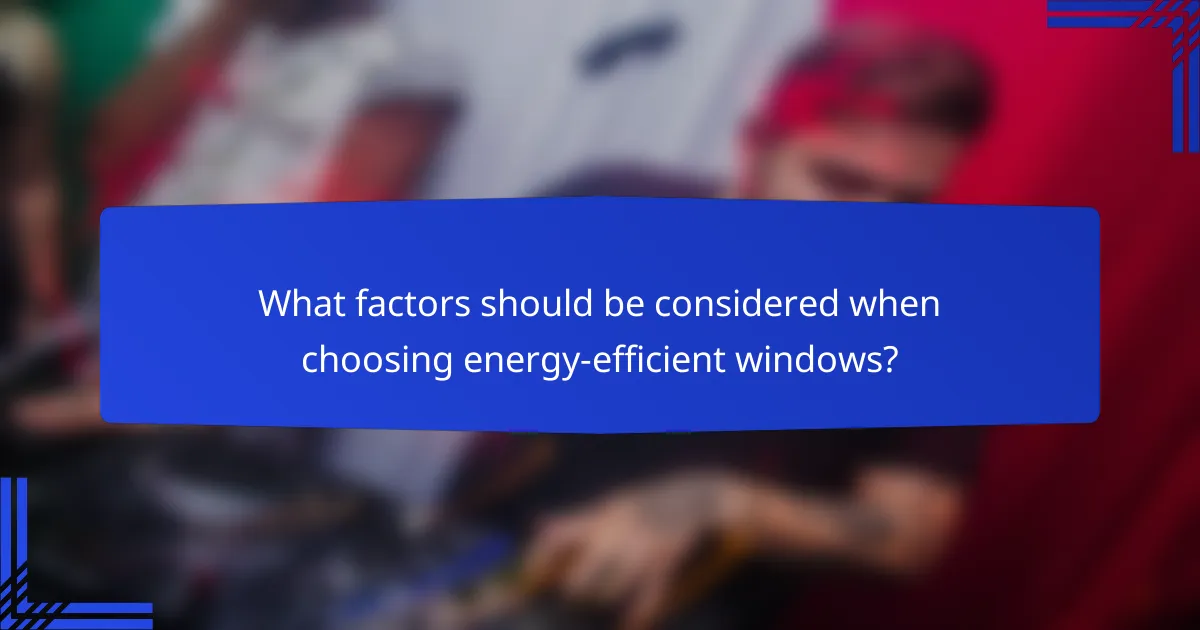
What factors should be considered when choosing energy-efficient windows?
When selecting energy-efficient windows, consider their insulation properties, noise reduction capabilities, and maintenance requirements. These factors significantly impact comfort, energy bills, and overall satisfaction with your home.
Window ratings and certifications
Window ratings and certifications provide essential information about energy efficiency. Look for labels from organizations like ENERGY STAR, which indicate that a window meets specific energy performance criteria. These ratings often include U-factor, Solar Heat Gain Coefficient (SHGC), and Visible Transmittance (VT), helping you compare options effectively.
For instance, a lower U-factor signifies better insulation, while an optimal SHGC can enhance passive solar heating in colder climates. Always check for these ratings to ensure you are investing in windows that will perform well in your environment.
Local climate considerations
Your local climate plays a crucial role in determining the best type of energy-efficient windows for your home. In warmer regions, windows with low SHGC values can help reduce cooling costs, while in colder areas, high insulation values (low U-factors) are more beneficial for retaining heat.
Additionally, consider the orientation of your home and the amount of sunlight it receives. For example, south-facing windows may benefit from triple glazing to maximize energy efficiency in colder climates, while double glazing may suffice in milder areas. Always tailor your window choice to local weather patterns for optimal performance.

What are the latest trends in energy-efficient window technology?
The latest trends in energy-efficient window technology focus on enhancing insulation, reducing noise, and simplifying maintenance. These advancements aim to improve energy performance while providing comfort and convenience for homeowners.
Smart window technology
Smart window technology includes features that allow windows to adjust their tint based on sunlight exposure, improving energy efficiency. These windows can be controlled manually or automatically, optimizing indoor temperatures and reducing the need for heating or cooling.
Some smart windows utilize electrochromic or thermochromic materials, which change their properties in response to environmental conditions. This technology can lead to significant energy savings, as well as enhanced privacy and glare reduction.
Innovations in materials
Recent innovations in materials for energy-efficient windows include the use of triple glazing and low-emissivity (Low-E) coatings. Triple glazing provides superior insulation compared to double glazing, reducing heat loss and improving soundproofing.
Low-E coatings reflect infrared light while allowing visible light to pass through, enhancing energy efficiency without compromising natural light. Homeowners should consider these materials for better thermal performance and lower energy bills.

How do energy-efficient windows contribute to sustainability?
Energy-efficient windows play a crucial role in sustainability by reducing energy consumption and minimizing greenhouse gas emissions. They enhance insulation, leading to lower heating and cooling costs while improving indoor comfort.
Insulation Improvement
Energy-efficient windows are designed with advanced materials and technologies that significantly enhance insulation. Features like double or triple glazing, low-emissivity (Low-E) coatings, and gas fills between panes help to minimize heat transfer. This results in less energy needed for heating in winter and cooling in summer.
When selecting energy-efficient windows, consider the U-factor, which measures heat transfer; lower values indicate better insulation. Look for windows with a U-factor below 0.30 for optimal performance in most climates.
Noise Reduction
Energy-efficient windows also provide effective noise reduction, making indoor spaces quieter and more comfortable. The same insulating properties that keep heat in or out also help to block external sounds. This is particularly beneficial in urban areas or near busy roads.
To enhance noise reduction, choose windows with thicker glass or laminated glass options, which can reduce sound transmission significantly. A Sound Transmission Class (STC) rating of 30 or higher is recommended for effective noise control.
Maintenance Ease
Energy-efficient windows are often designed for low maintenance, which can save time and money over their lifespan. Many models feature durable materials that resist fading, warping, and corrosion, reducing the need for frequent repairs or replacements.
When selecting windows, look for those with easy-to-clean features, such as tilt-in sashes or self-cleaning coatings. Regular maintenance, such as checking seals and cleaning frames, can further extend the life of your windows and maintain their energy efficiency.
